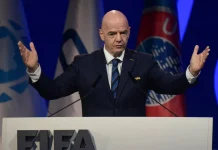Hosting the FIFA World Cup is a great honor representing unity and celebration. For a host country to successfully facilitate this global event, however, it must provide an environment conducive to the freedom of expression and cultural diversity that the World Cup represents.
One significant concern that has come across through this proposition of Saudi Arabia FIFA World Cup 2034 would naturally stop cheers or any kind of vocal love expressions. The 2022 FIFA World Cup in Qatar reached audiences of more than 5 billion people worldwide, speaking to the tournament’s sheer international appeal and the call for an inclusive host environment.
A very big part of a lively tournament is taken out – where the core and motive is to blend all with cultures and enjoy games, irrespective of boundaries.
Limitations of the Fan Expression and Culture
Saudi Arabia follows one of the most extreme representations of laws and customs under Islamic doctrines that teach how to express either gaiety or intimacy in a public setting. Although those practices are components of a country’s and its nation’s culture, the strictness of following religious ways often conflicts with what goes on in most of the world.
Fan behavior restrictions like Cheers and Celebration in Public Football supporters, in particular, can boast noisier cheers and roars, louder chants, and bright-colored celebrations. These fan exhibitions may involve singing and dancing and, in some instances, riotous behavior that is all part of the lively atmosphere to be experienced for a World Cup match.
Saudi Arabia FIFA World Cup 2034 would involve these public exhibitions of rowdy or noisy conduct that may be considered to be inappropriate or disruptive. Fans may avoid this for fear of being picked up or prosecuted for conduct that otherwise would be perfectly legal. Displays of Affection This could isolate fans from countries where such gestures are considered the norm, and thus suppress the celebratory spirit of the World Cup.
Gender Segregation and Female Fans
Traditionally, Saudi Arabia has segregated women from men in public areas. While there are attempts to loosen some of these restrictions, women spectators will still be restricted to seating areas or dress codes. This would discourage women from attending the matches, contrary to the concept of inclusiveness of the World Cup.
Gender Gap in Saudi Arabia: The Global Gender Gap Report 2023 ranked the country 127 out of 146, showing challenges in offering equal access and opportunities to women, such as female fans.
LGBTQ+ Fan Concerns
LGBTQ+ people are very vital in football. They are the footballers, fans, as well as activists who claim to fight for inclusiveness. However, Saudi laws are very strict against homosexual activities. This is why fans who are sexually inclined to the same gender might feel unsafe or discriminated against due to apprehension of legal action, social judgment, or just because of their identity. This is a direct clash with the principles of FIFA equality and non-discrimination.
69 countries criminalize same-sex relationships, a list that includes Saudi Arabia; this is a serious concern to LGBTQ+ fans and allies attending the World Cup, according to a 2021 survey by ILGA.
Undefined Rules for Spectators
The laws in Saudi Arabia are often deemed to be vague, especially those involving the so-called “immoral” or “indecent.” Foreign visitors who do not know the domestic laws could easily offend in these aspects. Fans cheering, wearing revealing clothes, or taking part in celebratory acts might unknowingly step on cultural lines, causing arrests or fines.
Social Media and Surveillance
Fans share their World Cup experiences through social media in this digitally connected world. However, Saudi Arabia FIFA World Cup 2034 content would be monitored online creating a privacy concern. Even unintentional criticism of local customs or laws may lead to grave consequences and dissuade fans from free expression online.
The Spirit of Fan Culture
The World Cup is more than a football tournament; it is a cultural festival. The event comes alive through the fan culture, be it the Mexican waves in the stands or the colorful parades by Brazilian samba dancers. Saudi Arabia’s restrictive environment may dampen these traditions, stripping the tournament of its vibrancy and authenticity.
Tourism Impact
International tourists constitute a high percentage of World Cup viewers who visit the place not only to witness the matches but also to enjoy the culture that the host country has in store for them. The entertainment rules of Saudi Arabia and the regulations regarding alcohol and nightlife are unlikely to entice those who want to fully experience a World Cup. This might translate into lesser numbers and reduced benefits to the host country in economic terms.
Boycotts and Protest
Protests or boycotts are likely to be forthcoming from the fans, teams, and sponsors who may not support the restrictive policies of Saudi Arabia. Such protests and boycotts will cause difficulties in logistics, bad press, and a loss in revenues for the tournament.
Alienation of International Fans
That means isolation from the rest of the world in case Saudi Arabia breaks connections with those things that alienate many in football. Fans’ perception that choice puts financial gain at the helm of what this sport represents would be jarring indeed.
However much the bid by Saudi Arabia to host the 2034 FIFA World Cup acts as an aspiration for it to become a global sporting and entertainment hub, restricting itself makes things challenging for the fans.
Conclusion
Football is a sort of common language, both played with wild rejoicing and cultural expression with everyone enjoying. Any attempt to curb these elements would only establish that the FIFA World Cup has become less than what it should be.
For Saudi Arabia to be a good host, it needs to address concerns over the restrictions on fan behavior and demonstrate commitment toward an open, inclusive, and celebratory environment. Until that happens, the potential limits on fan expressions such as cheering and displays of affection make Saudi Arabia an ill-suited choice to host the FIFA World Cup in 2034.













